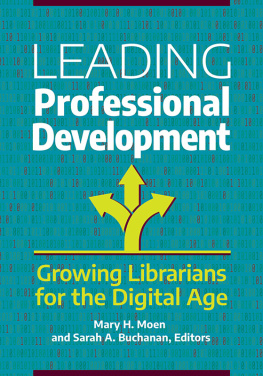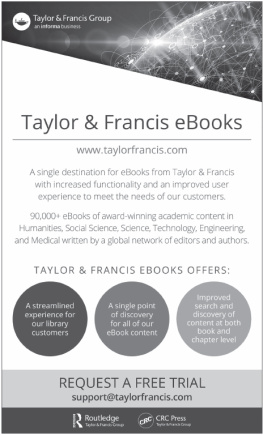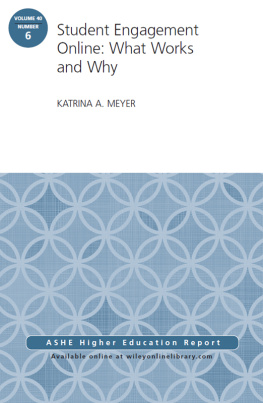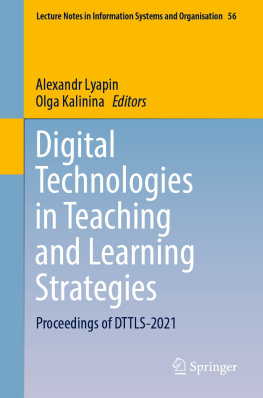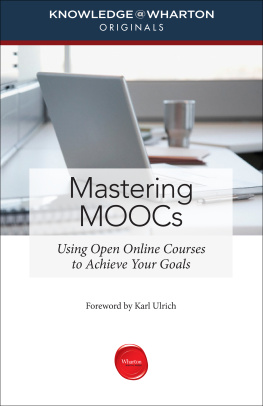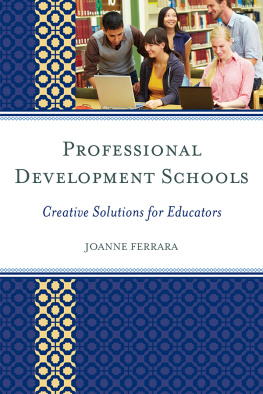Leading Professional Development
Leading Professional Development
Growing Librarians for the Digital Age
Mary H. Moen and Sarah A. Buchanan, Editors

Copyright 2021 by ABC-CLIO, LLC
All rights reserved. No part of this publication may be reproduced, stored in a retrieval system, or transmitted, in any form or by any means, electronic, mechanical, photocopying, recording, or otherwise, except for the inclusion of brief quotations in a review, without prior permission in writing from the publisher.
Library of Congress Cataloging-in-Publication Data
Names: Moen, Mary H., editor. | Buchanan, Sarah A., editor.
Title: Leading professional development : growing librarians for the digital age / Mary H. Moen and Sarah A. Buchanan, editors.
Description: Santa Barbara : ABC-CLIO, 2021. | Includes bibliographical references and index.
Identifiers: LCCN 2020007761 (print) | LCCN 2020007762 (ebook) | ISBN 9781440869099 (paperback) | ISBN 9781440869105 (ebook)
Subjects: LCSH: Career development. | LibrariansIn-service training.
Classification: LCC HF5381 .L3443 2020 (print) | LCC HF5381 (ebook) | DDC 020.71/5dc23
LC record available at https://lccn.loc.gov/2020007761
LC ebook record available at https://lccn.loc.gov/2020007762
ISBN: 978-1-4408-6909-9 (paperback)
978-1-4408-6910-5 (ebook)
25 24 23 22 211 2 3 4 5
This book is also available as an eBook.
Libraries Unlimited
An Imprint of ABC-CLIO, LLC
ABC-CLIO, LLC
147 Castilian Drive
Santa Barbara, California 93117
www.abc-clio.com
This book is printed on acid-free paper 
Manufactured in the United States of America
To Dr. Blanche Woolls,
educator, mentor, writer, and editor,
in appreciation of her long and steadfast commitment to
librarians professional development
Contents
Continuing professional development has long been acknowledged by a range of stakeholders as an essential ingredient for success in and of the information professions. Due to ever-increasing needs of the information society, information professionals assert that technical, cognitive, and behavioral skills are all fundamentally important in everyday interactions with users and are even rooted in shared values related to education and knowledge (Rice-Lively & Racine, 1997, p. 35). When todays information professionals seek to broaden and update those professional skill sets, they encounter various delivery mechanismsfrom just-in-time learning to mediated learning environmentsthat may meet their areas of need. The providers of such learning include professional organizations, grant-funded networks, nonprofit consortia, the State Library Continuing Education Coordinators Forum, and higher education institutions, among others. Indeed, research studies that ask who is responsible for professional development delivery find that no one provider is dominant (Rafiq, Jabeen, & Arif, 2017; Chan & Auster, 2003). Furthermore, a Continuing Education Summit hosted by the Institute of Museum and Library Services (IMLS) and OCLCs WebJunction program reinforced library administrators and directors convictions that educators and trainers, wherever they are based, must continue to collaborate and share best practices (Bullard, 2013). The consistency of continuing education as a professional concern suggests that perhaps the goal of library and information science (LIS) should be lifelong learning. It has certainly been subsequently embraced as a national priority by the IMLS. From there, each stakeholder in the LIS field could begin to make space for lifelong learning as a core activity that demands permanent and ongoing support.
Given that the field of librarianship largely requires a masters degree (the MLIS), prospective students and experienced professionals alike look to library educators as a source of expert knowledge in the selection and teaching of particular topics that meet the demands of information users and society (Cooke, 2012). How active are LIS schools in continuing professional development (or continuing education, as it is known in the United States)? Majids (2004, p. 61) study claims that because of their better resources, facilities, and highly trained manpower, LIS schools are positioned to make continuing education a priority. Educators at the aforementioned 2013 Summit acknowledged similar views, and some went further in constructing certificate programs for working professionals that consist of specialized coursework and are sustained by tuition or exam payments. In such a way, certificate programs stand in contrast to short-term, possibly grant-funded, workshops that meet targeted widespread needs. Continuing education not only belongs in LIS schools but also, as we have each examined in previous research, in state and municipal workforces (Moen, Mandel, & Karno, in press) and professional societies (Buchanan, 2011). Once employed in the field in a specific setting, information professionals seek personal and transferable skills to manage the changing information environments in which they work and practice for years or decades after graduation (Bin Hashim & Mokhtar, 2012, p. 153). The provider options through which they navigate vary along the nodes of duration, cohort size, instructor background, delivery mechanism, applicability, and relevance to current job responsibilities. With the title of this book, Leading Professional Development: Growing Librarians for the Digital Age, we engage the complexity of our current professional environment as our superstructure rather than infrastructure, thus not exclusively taking up digital technologies as the sole means for navigating our present environment. Of course, digital technologies are embedded in our behaviors and practices as we learn and communicate today, so readers will see their use in different types of learning experiences. However, the book explores learning in the digital age across multiple levels of immersion, from cohort-based experiences to personalized chat messages to skills sharing at international face-to-face conferences, in its nine chapters.
The introduction begins by proposing two overarching themes in the book: lifelong learning for communities and professional development and outward-facing engagement and networking for the improvement of library services. The authors provide a summary of each chapter along with a brief discussion of how they exemplify the proposed themes. provide tips, strategies, and case summaries of multiple solutions for professional development needs in the library profession. Because our world has become ever more complex, there will not be one solution that is best, so we have assembled nine examples that we have grouped by trend: digital technologies, practical tips, building community, and experiential learning.
To satisfy the readers interest in digital technologies for professional learning, highlights how digital tools are used to augment face-to-face learning at conferences.
For those readers interested in practical tips and strategies to run different types of professional learning experiences, this book provides a wealth of information on trends that go beyond digital innovations, as outlined above. , on the Lilead Leaders Program, describes the researchers findings and solutions for creating the right balance of face-to-face and online learning experiences to satisfy the needs of school librarian participants.

